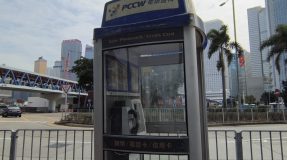YouTube link: https://youtu.be/Un6zoeCbw-M
Introduction
Xiru: Hi, today we are going to discuss the quuetion about what will be vanished in the next ten years. We will answer the question from five parts, that is we will answer five questions.
Zhuoyue: Yes, the answer is public phone booths. And we will talk about it with 6 parts.
Q1
Xiru: The fist one is what is the space/place/artefact/building that is vanishing. For this answer, we discussed and we observed the surroundings near Jardine House. After the discussion and observation, we suggest that the public phone booth is actually vanishing and it may be vanished in the next ten years.
Q2
Xiru: So why is it vanishing and how do we know that it will no longer exist in the near future?
Zhuoyue: Nowadays it’s pretty amazing to see how more and more people are using their own personal mobile phones. I mean, even folks who might not be that well-off can still get their hands on one, thanks to the rapid development of technology and the availability of second-hand phones. So, as you can imagine, this shift has had a huge impact on public phone booths.
In fact, the companies responsible for maintaining these phone booths might be facing some serious financial challenges. The thing is, with fewer people willing to pay to use them, the revenue they generate is dropping, while the cost of maintaining them stays the same. That’s a recipe for a loss.
Now, here’s an interesting twist: instead of just letting these phone booths sit idle, some creative minds have come up with alternative uses for the space they occupy. For example, they might replace the booths with bench seating areas for people to relax and unwind, or even use the space to plant trees to add a touch of greenery to the urban landscape. So, in the end, the decline of phone booths may actually lead to some positive changes in our cities.
Q3
Zhuoyue: So what do we know about it past and present, for the purpose?
Xiru: After we did some research, we found out that people use it to make phone calls when technology was not that advanced and no cellphone, for example. So they may need to use public phone booths to help them negotiate and communicate with other people that may be far away from themselves. And we can see that there were more phone booths in the past compared to the present. There is also a company called Hong Kong Telephone company that is incharge of this kind of public phone booths in Hong Kong. Also, this kind of public phone booth has no require of personal phone number or identification, it may have better signal in the past.
In the current society, public phone booths have become less common due to the widespread use of mobile phones. However, where they still exist, they typically consist of a small enclosed structure made of glass or metal. They are often equipped with a payphone, which allows individuals to make calls by inserting coins or using prepaid calling cards. Public phone booths are usually located in busy areas such as city centers, airports, train stations, or shopping malls and on the streets. They are designed to provide a private space for individuals to make phone calls, away from the noise and distractions of the surrounding environment.
Q4
Xiru: So can you tell me who will be affected when it no longer exist? What are their feelings and attitude toward this?
Zhuoyue: For this question, Actually, it’s interesting to think about how different groups of people might react to the disappearance of public phone booths. For instance, folks without cellphones might feel pretty anxious and desperate about losing this important means of communication. They might even be against the idea, as it takes away their access to phones.
On the other hand, the companies that built these phone booths might face a dilemma. Sure, they might lose some low-cost advertising opportunities since their logos are printed on the booths, but they’d also save money by not having to maintain them. It’s possible that the government might even step in to help cover their losses.
In additional, let’s not forget about the residents living in remote or rural areas with poor signal reception. Although the situation in places like Hong Kong might not be as bad as we think, these folks might still need more time to adjusting to life without public phone booths.
Furthermore, newcomers to Hong Kong without a local phone number might feel a bit disappointed by the lack of phone booths. But, you know, these days it’s actually pretty easy to buy a phone number card, so they’d just need to do a little research to find a solution.
All in all, the disappearance of phone booths affects different people in different ways, and it’s fascinating to see how society adapts to these changes.
Q5
Zhuoyue: What is being done about its impending disappearance?
Xiru: For the 5th question, what is being done about its impending disappearance. For this question, some people are just bystanders, because they have their own private phones, and they have no need to worry about public phone booths. For the second kind of people, the phone booths are vanishing gradually without any reminders, so they may even not notice that the phone booths are vanishing. Some of the other people who will be affected to buy new phones. Also, in recent years, the functionality of public phone booths has evolved to adapt to changing technologies. Many phone booths now offer not only traditional landline calling services but also internet access, charging ports for mobile devices, and even video calling capabilities.
Despite their decreasing popularity, public phone booths still serve as a lifeline for those without access to personal mobile phones or during emergencies when mobile networks may be overloaded or unavailable. They can also be useful for tourists or individuals who prefer not to use their personal phones for various reasons. In some places, public phone booths have been repurposed or transformed into other amenities, such as information kiosks, mini-libraries, or even art installations. This allows them to continue serving the public in alternative ways, even as traditional phone calls become less common.
Q6
Xiru: I have an additional question, what impact has the disappearance of public phone booths had on the urban landscape?
Zhuoyue: it’s quite fascinating to think about how the disappearance of public phone booths has really changed the urban landscape in several ways.
First of all, let’s talk about aesthetics. Remember those iconic red telephone boxes in the UK? They used to be such a defining part of the city’s visual identity. But now, with fewer phone booths around, some areas might lose a bit of their charm and uniqueness
There are also some environmental implications to consider. Getting read of phone booths means we have to recycle or dispose of the old structures, which can be a bit of a challenge. But on the bright side, fewer phone booths also mean less energy consumption and maintenance costs, which is a plus for the environment.
And finally, about how phone booths used to play a crucial role in emergency situations. Back in the day, if there was a crisis or an accident, people could rely on public phone booths to make those urgent calls. Nowadays, though, with fewer phone booths around, we might have fewer options to access emergency services when mobile networks are down or overloaded.
So, all in all, the disappearance of public phone booths has had quite an impact on our cities, from aesthetics to the environment and even emergency response. It’s a sign of the times, really, and it just goes to show how quickly our world is changing.
Conclusion
Zhuoyue: In the end, although the number of phone boxes is gradually decreasing, they are the product of an era, they convey a lot of happiness and tears through sound, and contain countless people’s memories. Even if they no longer exist in the future, it is undeniable that they are irreplaceable for the past era.
Thank you for your watching !
Five stills from video:





LIU Tianzhuoyue 3036268256
ZHAO Xiru 3036267733